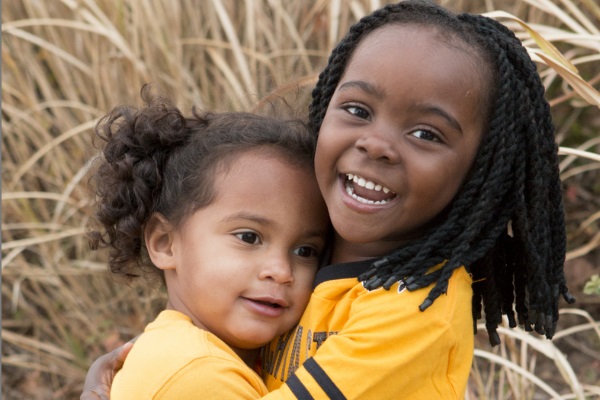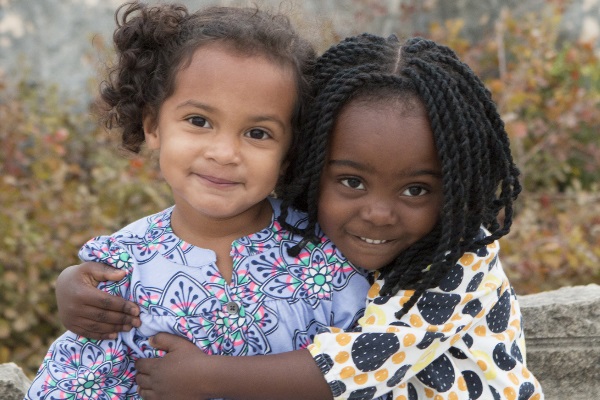Growing as an interracial family has delivered gifts, challenges and experiences that have forever changed me. I can only hope that I can positively impact the world by coaching and parenting two beautiful girls I’ve been given the honor of raising. While overwhelmingly positive, part of this growth has been deeply painful, as I’ve guiltily witnessed first-hand my privilege, and how frequently I blanket it over my daughters. As I gather a deeper understanding of racism and the essence of hate in our society, I am humbled and disappointed by my previous ignorance.
My anxiety about this issue has increased as the questions have become progressively more difficult for me to explain. Intensified by increasing political tensions about race, gender and class, my protectiveness, sensitivity, and frustration has been heightened. My beautiful chocolate daughters have started asking more thoughtful inquisitive questions, and race has not been excluded! Questions like: “Why do people call me black, when I am brown?”, “Why is our skin different colors?”, “When I grow up can I change my skin to yours?”, “What does ghetto mean?” This is coupled with statements like: “I am brown, you are white, and my sister is caramel.” “That person looks like me.” “My first-mom is my color.” “That girl made fun of my beads.”

These conversations and questions come up frequently and unexpectedly, like a moment last summer when my then 4-year-old full African American daughter made a disturbing comment. A sweet and friendly Asian woman frequently walks her two small “yippity” dogs in our neighborhood. These dogs are not kid-friendly dogs! Each time they walk by, the dogs bark, lunging their 3-pound leashed bodies at anything that moves. One day, while playing on the deck, our sweet neighbor and her barking dogs walk by, we waved and smiled, then my daughter casually says “Those dogs don’t like me because of my black skin.”
My heart sank, panic set in, and the potential responses had my head spinning. I frantically thought to myself, “Answer woman! Say something, anything hurry she’s looking at you!” After some silent seconds I calmly responded with a tone of reassurance “No darling it has nothing to do with your skin…It’s because you are 4 years old. Dogs get nervous around little kids.” She accepted my answer and went back to her life, but my mind was deep in reflection and lacking acceptance for my answer. What subtle things in her life spawned this comment? Am I contributing to that narrative? Would my deceased biological white daughter have posed me with the same comment? Those dogs don’t like me because of my white skin?
This is only one of many conversations about race I have already had with my three and four-year-old daughters during play, car rides and hanging out. My husband and I also know this is only the beginning. As my anxious, catastrophic-thinking mom brain brews over these deep concepts, I frequently reside alone in my head. At moments tears stream down my face with sadness and fear, then anger starts to swells, until eventually a feeling of helplessness sets in. A feeling of silent desperation…like there is nothing I can do!

How do we raise strong black women being a (slightly damaged) white couple? How will I protect my black daughters? How are YOU protecting my black daughters? And sadly, how do we prepare them for the racism they will experience from OUR peers? Are we doing enough? Have we been standing on the sideline in comfort and convenience for too long? Why did it take my daughters for me to understand?
I wish I had some brilliant words of wisdom, a vigorous and positive action you can take today. Titling this article “3 Ways to Talk to Your Kids About Race” or “5 Things You Can Do to Be A More Conscious White Person” constructing that perfect blog post that would enlighten all my white friends about the climate of raising a black child. Unfortunately telling someone what it’s like to be black or raise black children is like trying to tell a first-time mom what it is like to live with a newborn!
My mom heart feels fearful and desperate! The love for my girls is so aggressive it feels like my heart skips beats and aches in a chronic way. My strategy is awareness and openness, acknowledging my weakness and limitations as a white woman and exposing my fears and insecurities as I move forward – summoning courage to lead them, instilling confidence, worth and grit. Committed to constantly reminding them that with love, compassion and hard work they WILL change the world…make it a better place for EVERYONE…not just some!

















Thank you for writing this article. Like you, I hope the love my husband and I provide for our daughters can help comfort them in the future. A future that will surely bring some tough questions about race, identity and adoption. Nice to know we are not alone.
I agree it’s nice to know we are not alone, thank you for such a thoughtful comment! “We must build dykes of courage to hold back the flood of fear!” -MLK
Thoughtfully written and inspiring. Thank you for sharing, Megan.